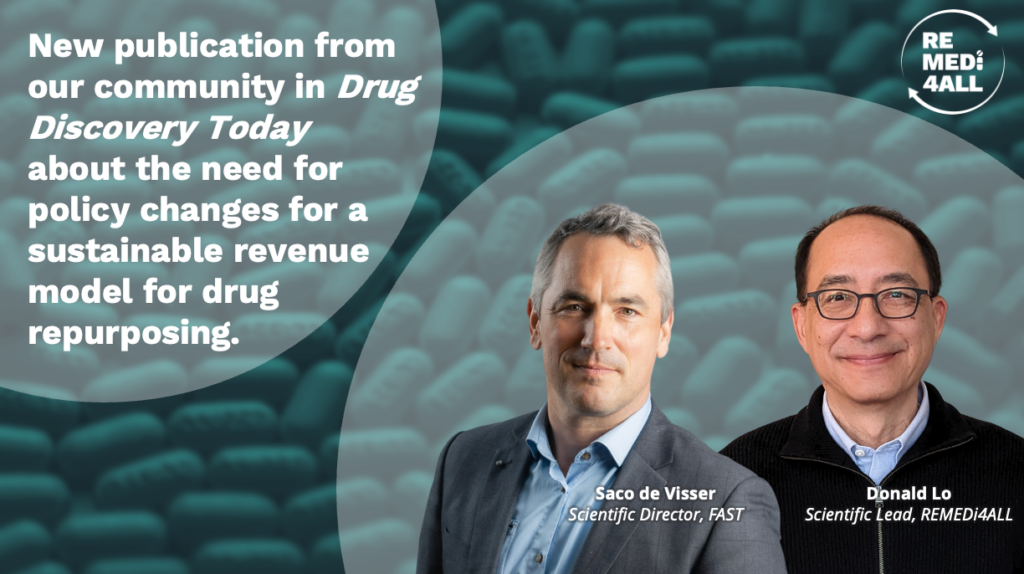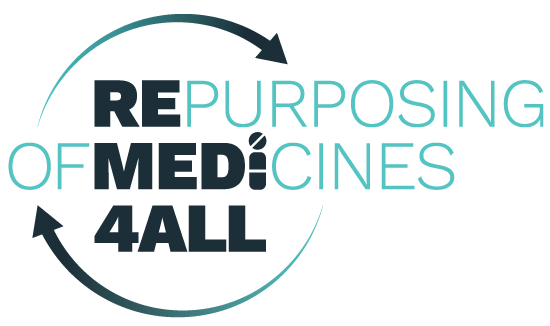REMEDi4ALL project partners have published an editorial in Drug Discovery Today. The project aims to accelerate drug repurposing with the publication highlighting the need for policy changes to enable a sustainable revenue model.
In a recent publication in Drug Discovery Today, Saco de Visser (Governor of EATRIS the Netherlands; FAST), Sibren van den Berg (Medicine for Society), Arend Mosterd (Meander Medical Center) and Donald Lo (EATRIS) highlight the need for policy changes to enable a sustainable revenue model for the reuse of existing drugs (drug repurposing). They highlight the immense potential for patients and opportunities to develop new, affordable therapies. The authors recommend that drug repurposing become a policy priority.
No sustainable business model
The opportunities for patients are currently insufficiently exploited: drug repurposing still rarely results in new authorized treatments. The main reason for this is that in many cases healthcare systems do not offer sufficient opportunities for drug manufacturers to recoup necessary investments. We now often see two extremes.

On the one hand, generic providers who want to develop and market new indications face negative incentives such as low prices and substitution by other brands of the same product. These conditions make it financially unattractive for them to invest in drug repurposing.
On the other hand, for some drugs, there is an opportunity to gain a monopoly, for example by developing a new formulation or through market exclusivity for orphan drugs. With those products, the price can become very high, complicating reimbursement.
Example of colchicine
The recent approval of colchicine by the FDA highlights these issues and caused a stir in the Netherlands. Colchicine, an anti-inflammatory drug used for centuries for gout, showed prevention of serious cardiovascular events in patients who have ever had a heart attack or suffer from narrowed coronary arteries.
Public agencies in the Netherlands and Australia and Dutch generic pharmaceutical companies funded the study on the use of colchicine in cardiovascular disease. In the U.S., a pharmaceutical company not involved in the study was able to register 0.5 mg of colchicine as a new medical product simply by referring to the published clinical data – without conducting a single additional clinical trial-. The company had acquired the patent from the Australian researchers. Since colchicine was only marketed in the U.S. in doses of 0.3 and 0.6 mg, a monopolistic position was available. The list price in the U.S. for this product is $621 per month. The Dutch companies involved in co-funding the repurposing trial wanted to market colchicine for €9 per month in the Netherlands, but low price guidelines and regulations for the original indication made this impossible.
Provide options for action
There needs to be policies that take advantage of the enormous potential of drug repurposing and avoid charging very high prices for products that require very little investment.
The publication in Drug Discovery Today outlines two options to make a reliable business model for drug repurposing:
- Establish voluntary, case-by-case agreements among stakeholders (companies, insurers, doctors, pharmacists) for setting higher prices
- Implement legal requirements to ensure separate, fair pricing for repurposed drugs.
The authors see legal regulation by the government as the preferred option because it provides a more structural solution that offers the most perspective and certainty to investors in drug repurposing. In a previous position paper prepared by Finitor Consultancy “Drug Repurposing as a Fast Route to Affordable New Treatments,” FAST described the options specifically for the Dutch healthcare system to leverage the immense potential for patients and emphasized the opportunities to make drug repurposing for new, affordable therapies appealing to manufacturers. However, it is essential to ensure that sufficient safeguards are in place to prevent unnecessary extreme price increases. Furthermore, the system changes needed for predictable, sustainable business cases for drug repurposing should be implemented in the EU. The Netherlands could play a pioneering role.
Current developments
FAST and RARE-NL (hub for rare diseases and drug repurposing) are currently developing a framework for drug repurposing to align the required investment for drug repurposing with the final price while ensuring it is not excessively high. That framework should also clarify which forms of repurposing should be exempted. We also investigate which pricing models are suitable for calculating what are reasonable prices for drug repurposing and what level of transparency about investments is then needed. At the same time, REMEDI4ALL is developing tools to streamline drug repurposing internationally, such as databases for financing and screening potential drugs.




